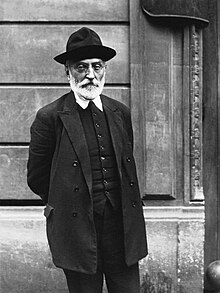This article contains translated text and needs attention from someone with dual fluency. (October 2024) |
Miguel de Unamuno | |
|---|---|
 Unamuno in 1925 | |
| Born | Miguel de Unamuno y Jugo 29 September 1864 |
| Died | 31 December 1936 (aged 72) |
| Nationality | Spanish |
| Alma mater | Complutense University of Madrid |
| Era | 20th-century philosophy |
| Region | Spanish philosophy |
| School | Continental philosophy Positivism Existentialism |
Main interests | Philosophy of religion, political philosophy |
Notable ideas | Agony of Christianity |
| Signature | |
Miguel de Unamuno y Jugo (Spanish: [miˈɣ̞el ð̞e̞ u.naˈmu.no i ˈxu.ɣ̞o]; 29 September 1864 – 31 December 1936) was a Spanish essayist, novelist, poet, playwright, philosopher, professor of Greek and Classics, and later rector at the University of Salamanca.
His major philosophical essay was The Tragic Sense of Life (1912),[1] and his most famous novels were Abel Sánchez: The History of a Passion (1917),[2] a modern exploration of the Cain and Abel story, and Mist (1914), which Literary Encyclopedia calls "the most acclaimed Spanish Modernist novel".[3]
- ^ "'The Tragic Sense of Life', by Miguel de Unamuno". gutenberg.org. Retrieved 27 August 2015 – via Project Gutenbert.
- ^ Abel Sánchez by Miguel de Unamuno. Retrieved 27 August 2015 – via Project Gutenberg.
- ^ "Miguel de Unamuno, Niebla [Mist]". www.litencyc.com. Retrieved 30 July 2024.